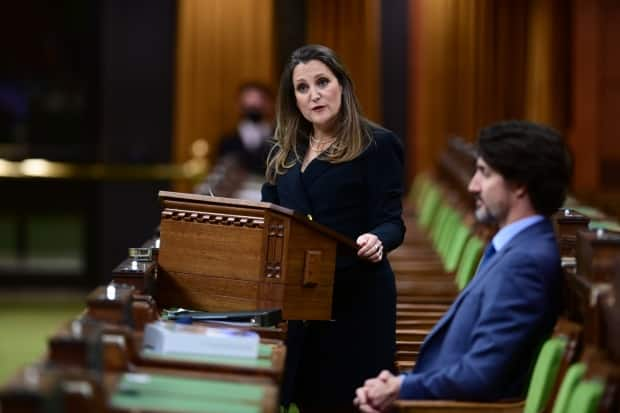Sask. calls money for VIDO-Intervac positive, looks for more details on other federal budget promises

Saskatchewan's premier and finance minister say they need more time to evaluate Monday's federal budget.
Premier Scott Moe and Donna Harpauer said there were items they were pleased to see but others they were disappointed in. Moe and Harpauer met with the media shortly after the budget was released Monday afternoon.
Harpauer said it was "very, very unusual" for provinces not to receive a technical briefing before the budget was made public and said she was "scrambling" to get details.
Moe applauded Ottawa's decision to pledge $59.2 million over three years to the Vaccine and Infectious Disease Organization-International Vaccine Centre at the University of Saskatchewan.
VIDO-Intervac has been working to secure funding for a Level 4 containment laboratory while increasing its ability for vaccine research.
"We are excited about this announcement as it allows VIDO to expand our capacity to rapidly respond to emerging human and animal infectious diseases and supports vaccine development including COVID-19," VIDO Director and CEO Volker Gerdts said in a statement.
In February, the Saskatchewan government announced $15 million toward the project, if it received federal funding as well.
Being a Level 4 facility would allow researchers to work with some of the most serious and deadly human and animal diseases. The province said the only other Level 4 facility in Canada is the National Microbiology Lab in Winnipeg.
The money from Ottawa is in addition to the province's contribution, $250,000 from the city of Saskatoon and private donations.
Moe said he was "happy" to see the money for the Saskatoon-based centre and thanked the federal government for its contribution.
Child care
Harpauer said the federal budget heavily prioritized child care.
The budget says Canadians will begin seeing a 50 per cent cut in their child care costs by the end of 2022, and forecasts that the average cost of daycare will be further reduced to $10 a day by 2025/26.
"We have increased our child-care spaces and have shifted to mental health and long-term care in this budget," Harpauer said of the province's 2021-22 budget commitments.
"My concern is that it doesn't tie up dollars that we would like to spend on mental health and addictions. We welcome some dollars."
Harpauer said the province was looking for details on if there was flexibility to use money for child-care spaces and early learning centres.
When it comes to long-term care, the budget includes $3 billion to Health Canada over five years, starting in 2022-23, "to support provinces and territories in ensuring standards for long-term care are applied and permanent changes are made."
Harpauer said long-term care is also a provincial "priority" but she was looking for more details and hoped the money could be used to reflect "each province's unique situations."
"Any funding into health care including long-term care is appreciated," Harpauer said.
She said she was "disappointed" the federal budget did not make mental health and addictions "a priority."
Farm fuel
One item prairie farmers and producers have been hoping to see was financial relief for carbon tax money spent fuel for things like grain drying.
The budget document said the government recognizes "farmers use natural gas and propane for their operations," and plans to "return a portion of the proceeds from the price on pollution directly to farmers in backstop jurisdictions (currently Alberta, Saskatchewan, Manitoba, and Ontario), beginning in 2021-22."
It is estimated that $100 million would be paid out to farmers this year with future payments dependent on "proceeds from the price on pollution collected in the prior fiscal year, and are expected to increase as the price on pollution rises."
Moe said returning $100 million to farmers is evidence the carbon pricing plan was flawed.
"It speaks to the fact that it never should have been charged in the first place. This pricing mechanism should not be charged to agriculture in any way," Moe said.
Carbon capture incentive
The budget also includes a tax incentive for Carbon Capture Utilization and Sequestration (CCUS).
It "proposes to introduce an investment tax credit for capital invested in CCUS projects with the goal of reducing emissions by at least 15 megatonnes of CO2 annually. This measure will come into effect in 2022."
The document said "investing in these technologies today is a significant step towards achieving Canada's climate targets."
Moe said he needs "further clarification" on what the incentive entailed and if it would be applied to enhanced oil recovery.
"We've been advocating for a tax incentive [for carbon capture], similar to what they have in the U.S."
The federal budget said, "Alberta and Saskatchewan have the greatest near-term potential to become global leaders in CCUS by creating new 'hubs' where carbon from high-emitting facilities can be efficiently captured, transported, stored, or used."
Debt concerns
One of the concerns raised by Harpauer was the rising federal debt, which is over $1 trillion
"Absolutely every Canadian should be concerned about the federal debt. And we are not seeing a plan on how they plan to address it."
Harpauer said she is also concerned about the province's rising debt, projected to reach $27.8 billion next year.

